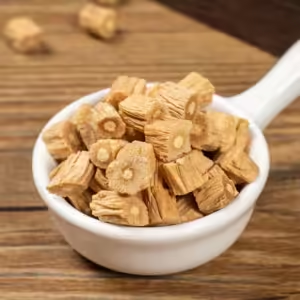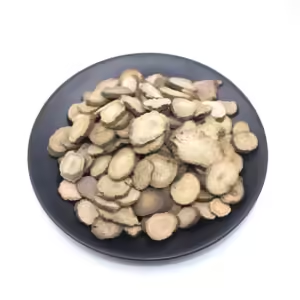Citrus aurantium – Zhi Qiao (zhi qiao), a Chinese medicine name. It is the dried immature fruit of Citrus aurantium L. and its cultivated varieties. It is harvested in July when the peel is still green, cut into two halves from the middle, and dried in the sun or at low temperature. It has the effects of regulating qi, relieving fullness, and relieving stagnation and swelling. It is often used for chest and flank qi stagnation, fullness and pain, indigestion, phlegm and fluid retention, and sagging organs.
Where is the main medicinal part of Zhi qiao?
Medicinal part of Zhi qiao:
It is the dried immature fruit of Citrus aurantium L. and its cultivated varieties.
Harvested in July when the peel is still green, cut into two halves from the middle, and dried in the sun or at low temperature.
Characteristics of the medicinal part of Zhi qiao:
This product is hemispherical, with a diameter of 3~5cm. The outer peel is brown to brown, with granular protrusions, and the top of the protrusion has a concave oil chamber; there are obvious style remnants or fruit stalk marks.
The cut surface of the mesocarp is yellow-white, smooth and slightly raised, 0.4~1.3cm thick, with 1~2 rows of oil chambers scattered on the edge, 7~12 lobes, a few to 15 lobes, the juice sac is shrunk and brown to brown, and the seeds are hidden. It is hard and not easy to break. It has a fresh fragrance and tastes bitter and slightly sour.
How are the ancient books about Citrus aurantium recorded?
“Compendium of Materia Medica”: “It treats urticaria all over the body, itching in the muscles like hemp beans, intestinal wind hemorrhoids, heart and abdomen qi, bloating and emptiness in the ribs, and congestion in the diaphragm.
“Bencao Gangmu”: “It strengthens the spleen and appetite, regulates the five internal organs, lowers qi, stops vomiting, and eliminates phlegm. Treat nausea, cholera, diarrhea, digestion, breaking up knots, five diaphragmatic qi, removing wind and improving eyesight, and pulmonary qi edema, benefiting the large and small intestines, and itchy skin. Hemorrhoids can be burned and ironed.
“Kaibao Materia Medica”: “It is used to treat wind itching and paralysis, clear joints, cough due to fatigue, stuffy back and shoulders, disperse retention, chest and diaphragm phlegm stagnation, expel water, eliminate fullness, large intestine wind, calm the stomach, and stop wind pain.”
“Zhenzhu Nang”: “Break up qi and relieve the unfavorable qi in the lungs.”
“Compendium of Materia Medica”: “Treat tenesmus.
Effects and efficacy
Fructus aurantii has the effects of regulating qi and widening the middle, removing stagnation and eliminating bloating.
What are the main effects and clinical applications of Fructus aurantii?
Fructus aurantii is used for chest and flank qi stagnation, fullness and pain, indigestion, phlegm and fluid retention; sagging organs. The performance and function are similar to Fructus aurantii, but the effect is milder.
What other effects does Citrus aurantium have?
The commonly used medicinal diet recipes of Citrus aurantium are as follows:
Digestion and appetite, promote qi and remove stagnation
· Stir-fried hawthorn 24g, raw bark sprout 30g, bran fried Shenqu 45g, stir-fried Citrus aurantium 24g, ginger roasted Chuan Houpo 24g, Linderae 24g, tangerine peel 120g, old tea leaves 90g.
The above medicines are dried, made into a coarse powder, mixed and sieved, and packaged in bags, 9g per bag.
·1 to 2 times a day, 1 bag each time, brew with boiling water, and drink warm instead of tea.
What are the compound preparations containing Citrus aurantium?
Zhishu Pills
Strengthen the spleen and digest food, promote qi and remove dampness. Used for weak spleen and stomach, poor digestion, and abdominal distension.
Zhishu Granules
Strengthen the spleen and digest food, promote qi and remove dampness. Used for weak spleen and stomach, poor digestion, and abdominal distension. Zhishi Daozhi Pills
Remove accumulation and remove stagnation, clear dampness and heat. Used for abdominal distension and pain, loss of appetite, constipation, dysentery and tenesmus caused by food stagnation and internal damp-heat obstruction.
Xiangsha Zhishu-Pillen
Strengthen the spleen and stimulate appetite, promote qi and eliminate lumps. Used for spleen deficiency and qi stagnation, abdominal distension, loss of appetite, and soft stools.
Weisu Granules
Regulate qi and eliminate distension, harmonize the stomach and relieve pain. Indications: Qi stagnation type epigastric pain, symptoms include epigastric distension and pain, spreading to the two flanks, relieved by belching or flatulence, aggravated by emotional depression and anger, chest tightness and loss of appetite, poor defecation, thin white tongue coating, and stringy pulse; chronic gastritis and peptic ulcer with the above symptoms.
Shugan Pills
Soothe the liver and harmonize the stomach, regulate qi and relieve pain. Used for liver depression and qi stagnation, chest and flank distension, epigastric pain, noisy vomiting, and acid reflux. Chaihu Shugan Pills
Soothe the liver and regulate qi, eliminate distension and relieve pain. Used for liver qi discomfort, chest and flank distension, unclear food, and vomiting of acid water.
Modern research progress on Citrus aurantium
This product has the pharmacological effects of breaking qi, promoting phlegm, eliminating accumulation, treating chest and diaphragm phlegm stagnation, chest and flank distension, food accumulation, belching, vomiting, heaviness after diarrhea, rectal prolapse, uterine prolapse, etc.
Verwendungsmethode
Citrus aurantium has the effects of regulating qi, widening the middle, promoting stagnation and eliminating distension. , Citrus aurantium slices are generally used, both for internal and external use.
How to use Citrus aurantium correctly?
When Citrus aurantium is decoctioned for internal use, the usual dosage is 3~9g.
When Citrus aurantium is used externally, take an appropriate amount of Citrus aurantium, decoct it in water for washing or fry it for hot ironing.
Citrus aurantium can be produced into Chinese medicinal materials such as Citrus aurantium and bran fried Citrus aurantium through different processing methods. Different processing methods have different effects, please follow the doctor’s advice for specific medication
Citrus aurantium is generally used in decoctions, decoctions are taken, and can also be made into powders or pills for consumption. However, the use of Chinese herbal medicines must be treated according to the syndrome differentiation and should be used under the guidance of professional Chinese medicine practitioners. They should not be used at will, and should not be used at will, let alone listening to Chinese medicine prescriptions and advertisements.
How to prepare Citrus aurantium?
Citrus aurantium
Take the original herbal medicine, remove impurities, wash, remove and soak, cut into thin slices, dry, and sieve out the fallen kernels. Stir-fried Citrus aurantium with bran
Sprinkle the bran into a hot pot and heat it over medium heat. When it smokes, add the Citrus aurantium slices and stir constantly. When it turns light yellow, take it out, sieve out the bran, and let it cool. For every 100kg of Citrus aurantium, use 10kg of bran.
What drugs should be used with Citrus aurantium at the same time with special attention?
The combined use of Chinese medicine and the combined use of Chinese and Western medicines requires syndrome differentiation and treatment, and clinical individualized treatment. If you are using other drugs, please consult a doctor before taking the medicine, and inform the doctor of all your diagnosed diseases and treatment plans you are receiving.
Instructions for use of Citrus aurantium
It is bitter, pungent and dispersing. Taking a large amount or taking it for a long time may cause loss of qi.
What are the precautions when using Citrus aurantium?
Schwangere sollten es mit Vorsicht verwenden.
During the medication period, it is necessary to avoid eating cold, raw and cold food, spicy and greasy food, and avoid smoking and drinking.
·Children: Children should take medication under the guidance of a doctor and under the supervision of an adult.
Please properly store the medicinal materials and do not give the medicinal materials you use to others.
Vermeiden Sie die Verwendung von Kupfer- oder Eisenutensilien zum Abkochen von Medikamenten.
How to identify and use Citrus aurantium?
Citrus aurantium is bitter, pungent, sour, and slightly cold. It belongs to the spleen and stomach meridians. It has the effects of regulating qi, widening the middle, and removing stagnation and swelling.
The pungent and dry effect of Citrus aurantium raw is stronger, and it tends to promote qi, widen the middle and eliminate swelling. It is used for abdominal distension and pain caused by qi stagnation, or distension and pain in the ribs, stasis and pain; uterine prolapse, rectal prolapse, gastroptosis.
Fried Citrus aurantium with bran can alleviate its harsh nature, tending to regulate qi, strengthen the stomach and digest food. It is used for stagnation of food, vomiting, belching, and itching of urticaria. For example, Muxiang Lang Pills are used to treat stagnation and fullness in the stomach; Fried Citrus aurantium with bran is suitable for the elderly and weak with qi stagnation because of its mild effect.
Medikamententipps
Die am häufigsten von Patienten gestellten Fragen
Q
Effects and functions of fried Citrus aurantium with honey bran
Fried Citrus aurantium with honey bran has the effects of promoting qi and removing bloating, strengthening the spleen and stomach, widening the chest and dispersing knots, and resolving phlegm and relieving cough. It can be used to improve symptoms such as cough and sputum, chest tightness, and inability to lie flat caused by stagnation of lung qi: it is used to treat abdominal distension, hiccups, nausea, and difficulty in defecation after eating caused by weak spleen and stomach. It is clinically used to treat diseases such as uterine prolapse, swollen and painful gums, hypertension, coronary heart disease, and chronic bronchitis in women.
The difference between the effects of Jishi and Citrus aurantium
The two come from the same thing, and although their effects are similar, their strengths vary. Citrus aurantium is a qi-promoting medicine, which is the dried immature fruit of the Rutaceae plant Citrus aurantium L. and its cultivated varieties. Zhishi is the dried young fruit of Citrus aurantium L. and its cultivars or sweet orange Citrus sinensis Osbeck. Zhishi is a young fruit with sharp and powerful qi, sinking downward, good at breaking qi and eliminating stagnation, resolving phlegm, and treating diseases such as internal stagnation, fullness and pain in the abdomen, constipation, heaviness after diarrhea, chest congestion, gastroptosis, uterine prolapse, and rectal prolapse. Zhike is a fruit that is close to maturity, with slow power and good at regulating qi, relieving distension, and is mostly used for mild symptoms of chest and flank or abdominal distension, food accumulation, and constipation. In addition, the two can be used together with yang-tonifying drugs to treat symptoms such as qi-sinking and organ prolapse.
Citrus aurantium – Zhi Qiao
Preisspanne: $58.88 bis $32,666.00
+ Gratis VersandCitrus aurantium – zhi qiao, a traditional Chinese medicine, is a Qi-moving medicine. It is the dried immature fruit of the plant Citrus aurantium and its cultivated varieties in the Rutaceae family.
Citrus aurantium is bitter, pungent, and slightly cold. It enters the spleen, stomach, and large intestine meridians.
Citrus aurantium is bitter, purgative, and dispersing. It is slightly cold but not warm. It enters the spleen, stomach, and large intestine meridians. It is good at regulating the rise and fall of gastrointestinal qi and regulating qi, relieving fullness, and eliminating bloating.
The nature, flavor, and meridians of the traditional Chinese medicine Citrus aurantium are the same as those of Citrus immature, but the effect is milder. Function: regulating qi, relieving fullness, and relieving stagnation and bloating.
| Gewicht | 1 kg, 10 kg, 100 kg, 500 kg, 1000 kg |
|---|




















Bewertungen
Es gibt noch keine Bewertungen.